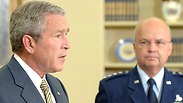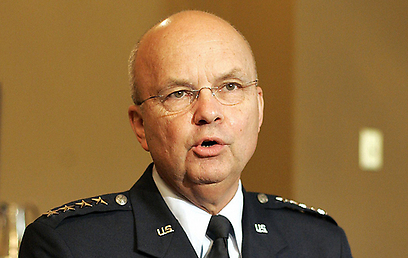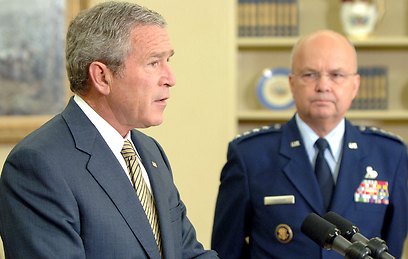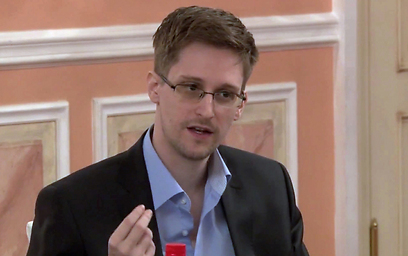
In post-Snowden era, 'the bad guys will take advantage of our blindness and deafness'
None
General Michael Hayden, the most prominent figure in the US intelligence community in recent decades, says he does not envy current NSA Director, who is charged with rebuilding the agency after the "serious blow" of the Snowden leaks. Thirteen years after the fall of the twin towers, Hayden meets Ronen Bergman in Manhattan, to discuss the revolution in American intelligence after 9/11, how he persuaded Bush to launch targeted killings of top al-Qaeda officials, his close ties to a Mossad chief, what is needed to defeat ISIS, why the world's biggest intelligence agency is peeking into your Gmail, and what this all has do with Angry Birds.
Part one of an exclusive interview. Click here for part two.
General (ret.) Michael Hayden wanted to meet me at Starbucks at the entrance to Penn Station, in the heart of Manhattan. But when we stepped inside, it became clear that at that time of the afternoon, the place was packed and we still had a none-too-short queue of New Yorkers waiting to be seated with their ground coffee. So we went outside and sat not far away, on a white fence, not the optimal place to interview one of the key figures in the world of intelligence, a former head of the NSA and the CIA, to talk about global secrets.
But for me - and definitely for him - there have been stranger encounters. So on that white fence under the late August sun that beat mercilessly down on Seventh Avenue, we both folded up our jackets, and plunged into a long conversation.
Later, as we took our leave and he turned with measured military steps to catch his train, a passerby asked me: "Tell me, is that him – the scary master spy, the one who's listening in on all of us?"
"I'm not sure I agree with the description," I replied, "but yes, that's the man you mean."
"Interesting," he said, "he actually looks like a nice guy. I was sure he was sitting with you here because he knew that someone was following him and wanted to stop him from listening in on your conversation."
* * *
There's no doubt – the meeting at the entrance to that packed Starbucks was not an exercise in preventing eavesdroppers or shaking surveillance, as that passerby believed, but he got at least one thing right: Michael Hayden really is a very nice man, welcoming and a lot more open, free and funny than you'd expect from a four-star general who has the world's biggest secrets lodged in his head.
In recent decades, 69-year-old Hayden has been the ultimate US super-spy. In the mid-90s, he served as commander of the Air Intelligence Agency (AIA) in the American Air Force, one of the most important intelligence units in the United States defense establishment, where he commanded some 16 thousand people.
In 1999, President Bill Clinton appointed him to head the NSA, the American National Security Agency, the world's biggest (and richest) intelligence organization. The NSA is responsible for what is known in the intelligence vernacular as SIGINT, signals intelligence - the interception, cracking and processing of phone calls and data transmissions throughout the world.
He performed that role during one of most demanding periods for the American intelligence community – the attack on the World Trade Center on September 11, 2001. And when the clouds of dust from the toppled towers dispersed, the task of revolutionizing the agency from top to bottom, in order to adapt it to a new threat, fell on his shoulders.
Hayden held this sensitive post until 2005, when he was transferred by President George W. Bush to be the first Principal Deputy Director of National Intelligence. The next year Bush, who saw him as his close adviser on matters of intelligence, directed Hayden to take up the role of head of the CIA, the Central Intelligence Agency - one of the most senior roles in the American intelligence community.
Hayden was asked once again transform the agency and adapt it to tackle the rising powers in the world of terrorism. He held the post until 2009. No other American has ever held all three of these most senior positions.
Because of these positions, especially at the NSA, Hayden found himself at the epicenter of the "Snowden affair", which has riveted the world since last June. The affair is, of course, named for NSA computer professional Edward Snowden, who leaked the deepest secrets of the agency to the media. Most of Snowden's disclosures relate to incidents that occurred during Hayden's tenure, and many of the leaked documents bear his name.
I have met with Hayden on several occasions over the past six months, including during a closed conversation with intelligence officials and diplomats moderated by German journalist Georg Mascolo. Not all of the things that I heard from him are, unfortunately, for publication. But what he did clear for publication offers a very rare glimpse into the decision-making at the heart of the world's biggest superpower, including those times when just he and the president of the United States stood in the Oval Office, and answered fateful questions.
Hayden also discusses his own close relationships with former Mossad chief Meir Dagan and former Military Intelligence (AMAN) directors, Major Generals Aharon Ze'evi Farkash and Amos Yadlin. He reveals how the United States began to eliminate high-ranking members of al-Qaeda, and explains what needs to be done to tackle ISIS. And why, with all due respect to privacy – and there is respect – when the bad guys started using Gmail, the intelligence organizations had no choice but to penetrate that system. Why? September 11, that's why.
* * *
"NSA had to make some decisions, we could either sit there and say 'stop, stop, I don’t want this stuff coming', or you can turn around and start swimming with it. We turned big data from the enemy to the friend."
* * *
Shortly after Michael Hayden was appointed NSA chief, the agency he headed began issuing warnings that al-Qaeda was planning a large-scale attack on American soil. An attack of this nature had been thwarted by chance on the eve of the millennium, yet warnings that they would try again fell on deaf ears.
A senior American official who had been present at meetings of Congress' Permanent Select Committee on Intelligence at the time confirms this. "Hayden and other intelligence officials gave warning, but the political echelons were not really listening, and we got September 11. After the twin towers collapsed it was clear that everything had to change, there was no choice but to restructure the intelligence community, to rebuild the NSA and adapt it to the new threat. We were certain that if we did not, there would be more attacks on American soil. In retrospect, perhaps we overreacted, but you have to judge things by the way they looked at the time, that world is collapsing, and we have to go to war."
According to claims made and documents provided by Edward Snowden to Der Spiegel, the Guardian and the Washington Post, the post-9/11 NSA under Hayden had massive budgets and operational freedom that went far beyond what it needed to fight terrorism. In fact, according to Snowden, the NSA became a global Big Brother, seeing and hearing almost everything - and storing a massive amount of information on the citizens of the world.
Most of the material leaked by Snowden has not yet been published, but what has emerged has been a forced striptease of the most secretive of agencies. Among other things, it exposed the existence of the PRISM surveillance system, which collects data on users of Google, Yahoo!, Facebook, Skype and more. It also revealed the most secret operation, the acquisition of American Metadata under Section 215 of the Patriot Act, information from telephony, such as who called whom, and when.
From the Snowden documents it also emerged that the American and the British intelligence agencies had been intercepting transmissions and wiretapping conversations of countless foreign leaders and heads of national and international organizations, including the United Nations and even international animal welfare organizations, as though cats are Iranian agents.
* * *
"We're not mad at Angry Birds, and we're not trying to defend the universe from Angry Birds. Although you might want to consider defending yourself from Angry Birds. If you aren't paying for the app, you aren't a customer, you're the product."
* * *
The documents also revealed that the NSA has been taking aggressive action against China (even as the US was complaining that Beijing was itself a cyber bully); that emails of the Israeli prime minister and defense minister were also on the list of objectives; and even that the NSA and British GCHQ was able to infiltrate the central servers of the globally popular Angry Birds game, and from there the phones of its 1.5 billion players.
Obama's White House chose to distance itself as much as possible from the Snowden affair, and the heads of the American intelligence community preferred to remain silent. But Hayden, freed from the shackles of official policy, prefers a sharp, strong and powerful response to protect his friends, and - to a large extent - himself. He half-heartedly confirms some of the facts, without saying so explicitly, but vehemently denies the allegations:
"The Snowden affair is as if we have come into the movie theater very late in the movie and we're seeing almost the denouement of the film in the headline of the media. This lack of clarity and a partial representation of reality led to a deep misunderstanding, erroneous reports and a duplicitous description of what was really happening.
"The Angry Birds affair was a superb example of this. NSA or GCHQ, they claim, intercept the link between your cell phone and wherever in the universe Angry Birds is headquartered, right? And then the story said 'thereby giving them access to the 1.5 billion people on the planet who have downloaded Angry Birds'. Now I must admit, if I came into the movie with that scene, I would be very concerned.
"But let's go back in the history of this particular film. Let's go back to the beginning. Let's go back to what does it mean for an intelligence agency to embrace or reject big data?"
Hayden explains that advancements in electronic communications have posed an unprecedented challenge for the intelligence community, all of whom grew up in a different era.
"All of us can remember when making a transatlantic phone call was almost a primordial act, requiring great planning and almost budgeting. We're all using our cell phones (from abroad), calling our families and checking our voice mail as if it were nothing. What happened in the great global telecommunications revolution is that we went from a world in which signals – electronic communications – were a rarity, to a universe in which they were omnipresent.
"I like the part where there's a limited number of communications bouncing off the sat-com links in the middle of the Atlantic. Because that allows me to target and go specifically to the communication I want to access. But that world ended. So, we're sitting there in NSA in 1999, we're saying big data is not our friend, big data is our enemy.
"NSA had to make some decisions, we could either sit there and say 'stop, stop, I don’t want this stuff coming', or you can turn around and start swimming with it. And that's exactly what we did. We turned big data (using large swathes of data and isolating one piece from another – RB) from the enemy to the friend.
"And we began to use the very concept of big data in order to preserve the capability that we had had for the past 45 years. Because if we could not work big data and make it our friend and use it to our advantage, then we would absolutely be deaf - we would not be able to perform the function for which we had been created.
"Returning to Angry Birds – we have absolutely no intention of using the information of the 1.5 billion people who have downloaded the game. There are three reasons why this is the case: Number one, it's fundamentally unethical; number two, it is really impractical; and number three, it is operationally self-defeating. We would never want to move what we could potentially access (on people's computers and cell phones) up the chain of intelligence production. How would that be of any benefit?"
But at the end of the day, you are harming the privacy of civilians.
"When you start to process the information in which you have an interest, which is a small speck within all the data you may have the ability to access, in one sense you might be seen to hurt the rights and the privacy of those people from whom you have taken the information, at least theoretically. But there is nothing to be done about that. There is no other way to begin the process of collecting intelligence to safeguard our collective security.
"Before I came to NSA, our target was the Soviet Union, all day, all night, 7 by 24, 365. One of the big targets in the Soviet Union was the Strategic Rocket Forces (SRF). We spent about the gross domestic product of a Central American country to put satellites in orbit, to be able to catch the communications coming out of the SRF headquarters in Moscow, up over the Ural Mountains, and going out to the ICBM (intercontinental ballistic missiles) fields in Soviet Asia and Soviet central Asia. We were on that dedicated network looking for words of interest like 'launch'."
This effort, says Hayden, was aimed at having an early warning of a possible nuclear attack on the United States. But in the new millennium, the Soviet threat has been replaced by a different enemy, and according to Hayden there is no alternative but to track them electronically. "The 21st century equivalent of that Soviet signal are the terrorists, WMD proliferators, drug traffickers, transnational crime individuals. Their Gmails are scooting along that same fiber optic cable as your Gmails and my Gmails. And so if you want these intelligence organizations to do what it was they did for you - protecting you from dangers like the Soviets - there is no way for them to do that task against today's enemies without touching the data stream in which your personal communications are located. That is just a fact of physics.
"Now, with regards to Angry Birds, we're not mad at Angry Birds, and we're not trying to defend the universe from Angry Birds. Although you might want to consider defending yourself from Angry Birds, because the free software app that you can download apparently sucks the brains out of your iPhone and sends it back to the Angry Birds starship, where they then process the data for sale. If you aren't paying for the app, you aren't a customer, you're the product.
"What NSA apparently does - and here I'm only reflecting what I have read in the newspaper - is legitimate intelligence targets, if they're stupid enough to download Angry Birds, we're going to jump on that link going back to the Angry Birds starship and we're going to read all the brains of his iPhone too. But it's not about Angry Birds per se, and it's not about sucking up the data of 1.5 billion people who have downloaded the app."
* * *
"How do I explain how someone so young, and frankly without a great deal of experience, could have done something so seemingly sophisticated, and my hypothesis is, well, maybe somebody helped him."
* * *
"So at the bottom line," I ask in a semi-teasing manner, "did Edward Snowden's leaks cause damage to the United States?"
Hayden's response is booming laughter, but he rolls what was a rhetorical question over into a suddenly serious one. "The Snowden revelations are the single greatest hemorrhaging of legitimate American secrets in the history of our country." The damage, he says is "on three levels: Number one, truly operational. Of course, I will not get into the details of what we lost, but let me assure you - the enemy has responded and we have lost our ability to cover very important targets.
"Second is relationships with good friends. You'll mainly think of Germany and the whole concern about Angela Merkel (phone tapping), but I mean on a different level - what friends would trust the United States to keep a secret? We enter into sensitive relationships with many foreign partners. They're not illegal, but they do require great discretion. Why would a foreign partner believe that the United States would be discreet?
"And the third harm is to American industry, which has been unfairly singled out. American industry doesn’t do anything more for American security services than any other industry in any other country in the world. It's just that we are focused on what American industry does or may do, because of Snowden.
"Now everyone is focused on to what extent Facebook is or isn't passing information to NSA. But American industry only offers the United States intelligence community the same legal and legitimate assistance as any other industry in the western world.
"These all constitute very serious damage. Now, I want to be fair and open with you on the subject of the extent of the damage, and put it into perspective. Signals intelligence's advantage is always transient; you never have a permanent advantage. It's not like you succeed in cracking a target and it's yours forever. If the target simply decides to change operating systems, you lose coverage. We're used to losing targets all the time.
"But because of Snowden, we suffered such a serious blow. We have never seen losing so much over a short period of time, and it will take us more money and more time to recover.
"In the meantime, the bad guys, those whom we are working against, those conspiring to harm America and world peace, will take advantage of our blindness and our deafness. I don't envy Mike Rogers, the incoming head of NSA, who has to rebuild everything that was destroyed."
In the Western world, law enforcement agencies go to courts to get approval for limited tapping of a particular phone number or email account for a specified period of time. In NSA, you uncovered insane amounts of information about billions of civilians around the world without having even the slightest suspicion against those people. Why?
"First, the United States is the only country in the world whose intelligence community wiretapping is subject to judicial approval - a special court to approve wiretaps. Second, when you discuss the appropriateness of intelligence, please do not confuse it with law enforcement. They are very different things. Law enforcement is about punishment, intelligence is about prevention. Law enforcement tries to drive evidence to a point beyond reasonable doubt; intelligence is designed to enable action in the face of doubt. They are quite different.
"One of the accusations made about bulk collection is that it is suspicionless, but that word doesn’t actually have a great deal of meaning in intelligence. We are not trying to find the guilty, we're trying to identify the not-yet-guilty, so that we can prevent the action. There is a great deal of difference between NSA and FBI - I have to prove a lot less than the FBI in order to lawfully violate someone's privacy, while the FBI has to prove more because only the FBI can take away a person's freedom with that information.
"By the way, all this activity has been approved by two presidents (Bush and Obama – RB), who are very different to one another. Everything we do has also had bipartisan Congressional approval. I was always more comfortable when the two political branches (Congress and the President) supported our activities."
Snowden claimed that every junior analyst at agency headquarters has access to data on the phone and email accounts of each and every one of us. This seems to be a serious and unnecessary blow to our privacy.
"Look, the NSA is a large body. No one can fully and entirely guarantee that these databases are never abused. The Agency has said that there have been such rare cases. Obviously one has to be very, very careful inside the agency. But that is a very far cry from Snowden's claims, which were false across the board. Let me give you a sense of the way the American meta database is handled - it's billions of records. Twenty analysts are authorized at NSA to devise queries of the database. Two people at NSA are authorized to approve the query.
"We don’t data mine it; we don’t launch algorithms against it, which actually might make sense. But out of a sense of privacy, we don't do that. The only thing we get to do about that database is to query it.
Such as?
"If we come across a cell phone number in a safe house in Yemen, a number we've never seen before, we get to go to that database and say, 'has that number ever showed up in this database', which is domestic American activity. We can check if it is in the database, and who it has called. If this program had been installed before September 11, it is highly probable that we could have prevented the attack.
"In all of 2012, the database was queried 288 times. Those queries implicated a total of 6,000 US numbers, that's it. So, here you go - it went from billions, as in the story about Angry Birds, to 6,000 - in reality, a totally different scale."
What is there to know about Snowden's character and motivation?
"In my opinion, Snowden was not an innocent shocked by what he had found - he was a hunter. He makes the point that what caused him to do this was Jim Clapper (James Clapper, the director of American national Intelligence), when he testified to the Senate Intelligence Committee in March. But we know as a matter of fact, because the journalists have told us, that he had contracted Laura Poitras and Glenn Greenwald in earlier December and January, saying 'I have got a lot of information for you.' He impressed upon them the great sensitivity of the material and the significance of its exposure."
Edward Lucas of the Economist published a book called "The Snowden Operation", in which he raises the theory that the whole thing was a Russian intelligence operation from the start. Do you support this theory?
"I have no evidence of that. Let me tell you how I think about that, but you need to be careful how you write it, because I don’t accuse anyone of this. I'm an intelligence officer, you're a newspaper man, we base it on facts. I don’t have any facts, but if I work it backwards, how do I explain how someone so young, and frankly without a great deal of experience, could have done something so seemingly sophisticated, and my hypothesis is, well, maybe somebody helped him.
"So, it's certainly a working theory, I have no evidence. For now, at least."
Read part two of this interview.
Translated by Sara Miller.













